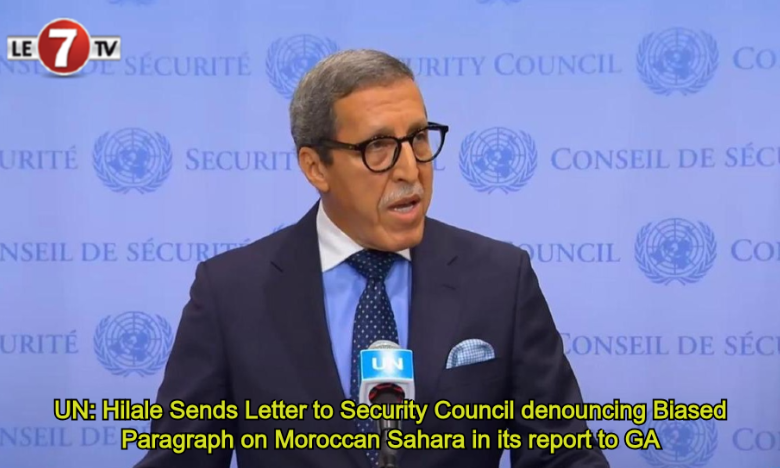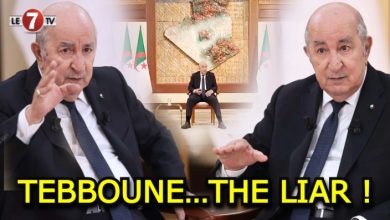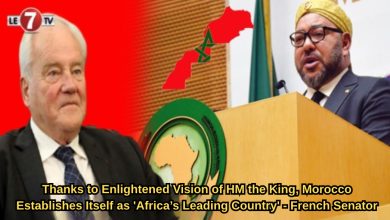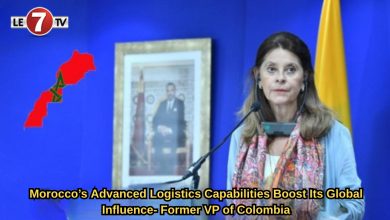UN: Hilale Sends Letter to Security Council denouncing Biased Paragraph on Moroccan Sahara in its report to GA
United Nations (New York) - Morocco's Permanent Representative to the United Nations, Ambassador Omar Hilale sent a letter to the President and members of the UN Security Council, in which he denounces a biased paragraph on the Moroccan Sahara in its latest report to the General Assembly.

In this letter, Hilale expressed, following the adoption by the Security Council of his informative report to the General Assembly for the year 2024 on Friday, May 30, 2025, as well as the observations and reservations expressed by some members of the Council in this regard, the deep surprise and firm rejection by the Kingdom of Morocco of the singling out of “two parties” in the paragraph relating to the Moroccan Sahara in this report.
Among Morocco’s observations in this regard, the Ambassador indicated that the introduction to this Security Council report specifies, in its final paragraph, that the very purpose of this section “is not to provide an exhaustive list of the Council’s meetings, developments, or responses. Rather, it is intended to provide a succinct and useful overview of the main developments that occurred throughout the year”.
However, he pointed out, the biased paragraph on the Moroccan Sahara in the report’s introduction blatantly deviates from this directive, which has always guided the drafting of previous annual reports, noting that far from faithfully reporting the Security Council’s position and its sincere efforts toward a just, and lasting political solution to this regional dispute, it presents a partisan and unbalanced interpretation of the positions expressed within the Council on this subject.
Hilale noted that this paragraph only reflects, selectively and without context, the national position of the author of the introduction and that of a non-permanent member of the Security Council and ignores the contributions and positions expressed by other members, thus moving away from the consensus within this body.
The Ambassador emphasized that, contrary to the paragraph’s claim, the Security Council has mentioned the same all four parties to the political process: Morocco, Algeria, Mauritania, and the “polisario,” citing them five times in all its resolutions since 2018.
Furthermore, no report from the Secretary-General or resolution from the General Assembly singles out two parties to the detriment of the four stakeholders in the political process, he reiterated, adding that the drafter’s biased approach is, moreover, contradicted by the current international dynamic, marked by broad support for the resolution of this regional dispute on the sole basis of the Moroccan Autonomy Initiative, while respecting the sovereignty and territorial integrity of the Kingdom.
This serious and credible initiative is strongly and openly supported by 116 countries, including two permanent members of the Security Council, which the United Kingdom has just joined today, as well as three non-permanent members who served on the Council in 2024, and six among the current non-permanent members, he continued.
Hilale noted that by departing from the established practice of factuality and neutrality that traditionally characterizes the Security Council’s reports to the General Assembly, this approach undermines the Security Council’s work vis-à-vis the General Assembly. Moreover, it calls into question the General Assembly’s confidence in the integrity of the reports transmitted to it by the Security Council, he said.
“Instead of attempting to mislead the General Assembly by referring to its national position and that of a non-permanent member of the Council, which is also main party to this dispute, the drafter of this section should have demonstrated neutrality and objectivity by informing the General Assembly of the constants and foundations of the political process established by the Security Council, which are the parameters of the political solution, the four stakeholders, and the preeminence of the Moroccan Autonomy Initiative for the definitive settlement of this regional dispute,” he further noted.
Hilale also emphasized that the drafter should also have refrained from opposing the restoration of the factuality of this section by invoking a so-called “procedural integrity,” which cannot prevail when such a blatant inaccuracy is reported at any stage, noting that the objectivity and factuality of the report are a political prerequisite for the Security Council’s mission as guarantor of the political process for the settlement of the Moroccan Sahara issue.
For all these reasons, the Ambassador affirmed that the Kingdom of Morocco strongly denounces this failure to uphold the rigor, impartiality, and integrity of this section of the report and also rejects the politically motivated distortion of this paragraph, which can only be seen as a vain attempt to undermine the international momentum in favor of the political process initiated under the exclusive auspices of the United Nations.
Ambassador Hilale’s letter to the President and members of the UN Security Council was also forwarded to the President of the General Assembly and the Secretary-General. It will be issued as an official document of the Security Council and the General Assembly.
Editorial team/le7tv








